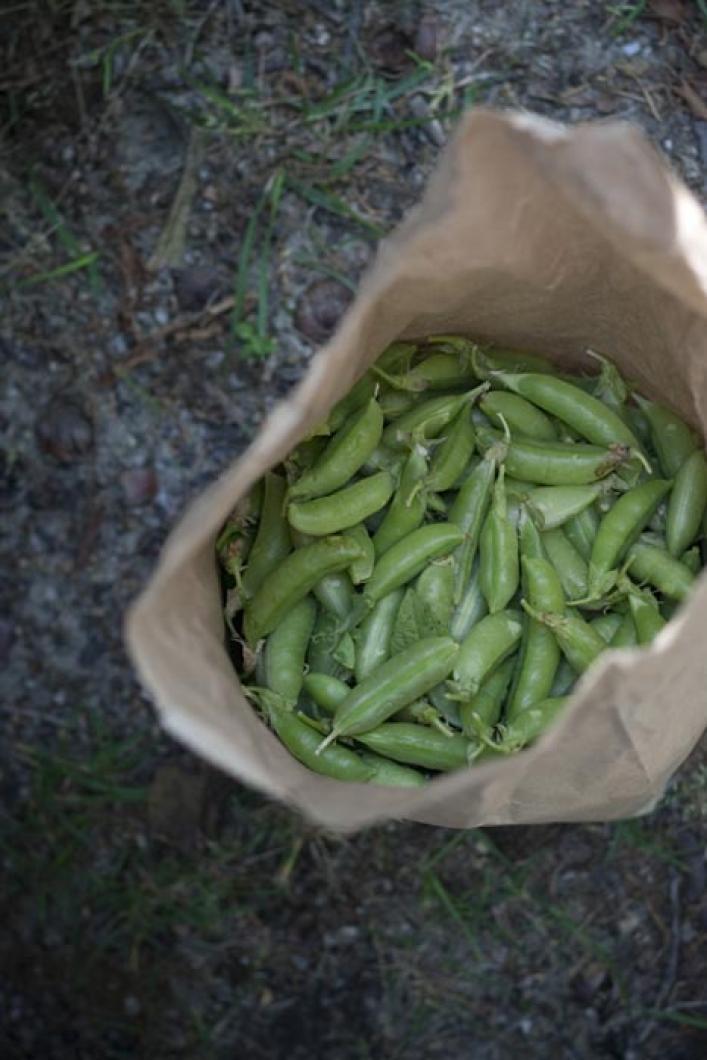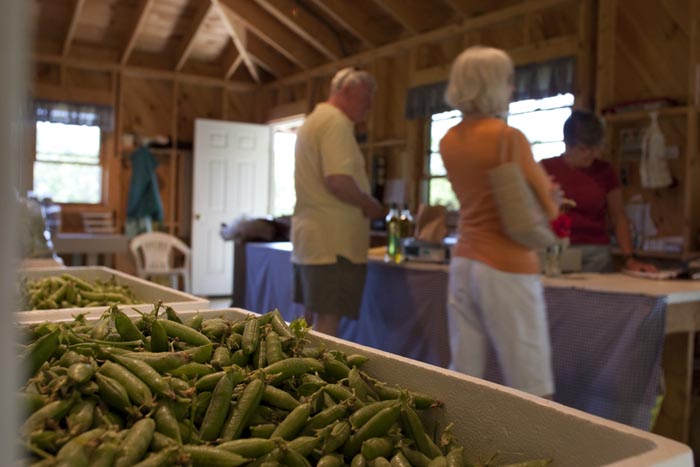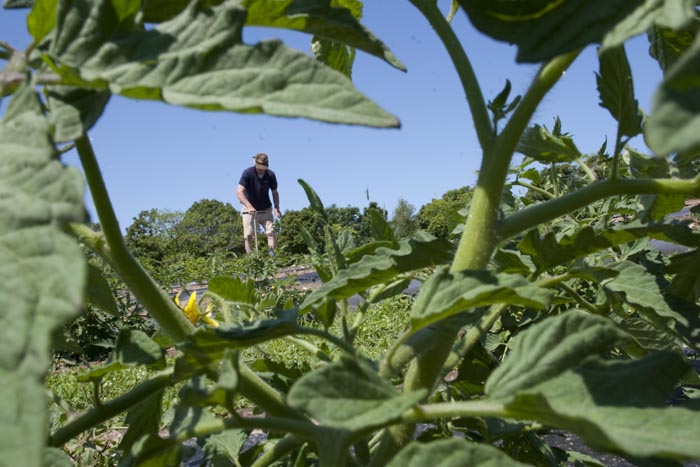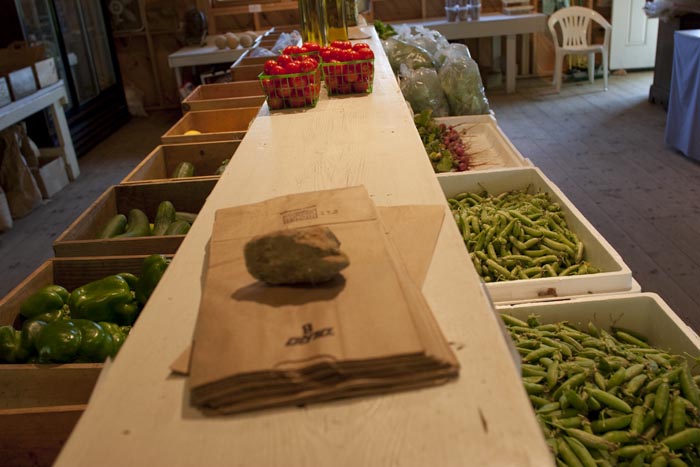Snap, shell, snow: June means pea season on the Vineyard.
It’s a rite of summer, seeing the “We Have Our Peas” sign placed for the first time in front of the Bayes Norton Farm stand on Edgartown-Vineyard Haven Road. (The Vineyarder who originally painted the sign wrote “Pease,” thinking it was spelled the same as the old Island family.)
Their peas are so sweet it’s as though owners Jamie and Dianne Norton added sugar to the soil.
Mr. Norton was showing one of his pickers on Saturday morning how to properly pick a pea pod. He pulled back the gangly plant and pointed out the pods still attached underneath the vines, gently combing through them. There were 30 rows to pick today, and Mr. Norton expected to get about 40 pounds each of sugar snaps and shelling peas.
“Make sure when you pick it it’s really plump,” he instructed. “Once you pick the pod it doesn’t get any plumperbut you don’t want them to get too big, either.”
The Nortons have balanced teaching how to pick peas with teaching math and reading at the Martha’s Vineyard Regional High School since 2004, when they took over the farm from Mr. Norton’s father, Jim Norton. The couple moved back from New Hampshire in 2001, and built the new farm stand in 2005.
It’s a delicate dance between their farming, teaching and home life, one that leaves little time for much else, but they make it work. Many people on the Vineyard have multiple jobs, but to have such consuming jobs as teaching and farming is unusual.
“The biggest challenge is time, to be able to get out here and watch the crew,” Mr. Norton said. The Nortons’ crew typically changes every year but they are never short of labor. On one of the edges of the field is the bunkhouse – college students work four mornings a week in exchange for rent.
“I come home and the crews have already picked, they’re done before I get out of schooland then I’m out [farming], then I’m taking my kids to swimming or tennis. It’s busy. Sometimes I’m planting after dinner until 8:30 at night because it’s still light enough.”
Mrs. Norton agreed, but said family always comes first.
“It’s been really difficult but what I’ve learned from doing it is that I can’t do it all 100 per cent,” she said. Mrs. Norton primarily runs the stand now. “If I have to make a choice, I always do what’s better for the familyit’s very easy to have the family part take a backseat, and then you realize you can’t do this all the time.”
One night Mr. Norton came home with peas for dinner and sautéed them, but their sons Dougie, 9, and Jonathan, 7, looked at them with curiosity – peas could be cooked? They refused to eat them hot.
“Dougie loves running the stand, he’s good with numbers, and Jonathan loves weeding and picking,” Mr. Norton said, remembering when Jonathan was shorter than the wheel hoe he loved to push through the rows, his face sticking through the handlebars. “He loves to be the farmer ... we’ve got both ends covered, retail and production.”
Farming runs in the Norton blood, and the 10 acres of cultivated land dates back centuries. The property was bought by Edmond Cottle from Chief Ponit, Sachem of Nobnocket, in 1696, and handed down to Mr. Cottle’s daughter Abigail. Abigail married Jonathan Presbury in 1720 and built the house where Mr. Norton grew up. Before Mr. Presbury died at sea, he fathered a daughter, Maria, who married Eliakim Norton in 1735. From these Nortons the land was passed on to the Tiltons, and Mr. Norton’s great-great-great-grandfather Bayes Norton bought the land from Jonathan Tilton in 1837.
Although you wouldn’t know it from the busy Edgartown-Vineyard Haven Road stand, much of the farmland is in walking distance of the Upper Lagoon Pond and as a result enjoys a warmer pocket of air.
“Jim Athearn [owner of Morning Glory Farm] always describes our place as being tropical,” Mr. Norton joked. They often get vegetables earlier than the Edgartown farm, even with late plantings sometimes due to the demands of school. “April vacation is a big planting time, so this whole field is planted then; now we’re trying to recover it [from weeds and wild mustard].”
The rows are set at a diagonal this year for both functional and aesthetic purposes. Customers drive in and are met with the rolling fields of vegetables, but Mr. Norton also planted on an angle to prevent erosion. He said there was a series of canyons on the far edge of the main field and changing the orientation of the crops would help sustain the soil.
But back beyond the eggplant, radishes, carrots, lettuce, zinnias, strawberries and of course the peas, lies the tomato field. It is this corner of the farm Mr. Norton’s father, Jim, tends.
“He’s been putting in a full day’s work of farming, and I don’t understand how the tomatoes did so well before, because now they’re getting all of his attention,” Mr. Norton said of the Juliette, cherry, beefsteak and heirloom tomatoes. They seeded 3,000 plants indoors in January, and the Nortons are usually blue ribbon winners at the annual Martha’s Vineyard Agricultural Fair.
Mr. Norton described farming as a “losing winning battle,” and while their tomatoes and peas may be doing well, one crop in particular has not done as well as expected. The jilo, an eggplant popular in the Brazilian community, usually has crowds lined up at the farm stand door but from the 1,000 plants seeded this year only 60 germinated.
“We only pick jilo on Tuesdays and Fridays; we open at 9 and at 9:05 we’d be sold out,” Mr. Norton said. “Now they won’t even come because this [yield] won’t be able to produce enough for one person.”
One strawberry crop also failed this spring, but Mr. Norton said he expects the next batch to be successful and even wants to expand their berry production because they’re easy to start and easy to maintain during the school year.
Mr. Norton identifies as both a teacher and a farmer, and although he claims his classrooms skills don’t translate to the soil, it was natural for him to use his farm as a teaching moment.
“We’re sustainably grown, we’re never going to be organic because we don’t have the time for paperwork, but we follow the organic practices,” he said. “What we want people to understand is that sustainably grown can mean organic with out the label.”
This column is meant to reflect all aspects of agricultural activity and farm life on the Vineyard. To reach Remy Tumin, please call 508-627-4311, extension 120, or e-mail rtumin@mvgazette.com.










Comments
Comment policy »